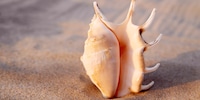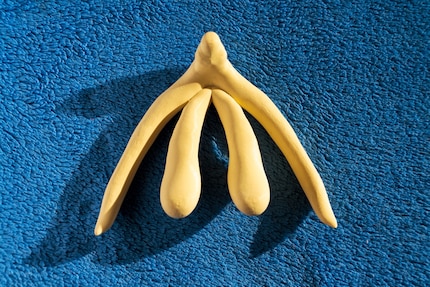
Background information
Viva la vulva: 7 myth-busting facts
by Olivia Leimpeters-Leth

Anyone who thought the vagina was just another hole to be filled probably reckons they can neglect the clitoris too. And they’d be in good company. In fact, for millennia, the clit was shunned as a meaningless organ of the female anatomy. It’s time to put a stop to this. Allow me to introduce: the clitoris in seven facts.
Ah, the vulva. As this book points out (in German), it’s the «gateway to life». And yet, it raises so many questions. For 2,000 years, we’ve been dissecting women’s bodies in the hope of getting a glimpse behind the mechanisms of female desire. To put this into perspective, fewer than twelve years passed between the first rocket blasting into space and the first man landing on the moon. If I were the type to exaggerate, I’d argue that the road to female emancipation and female orgasms has been rockier than the moon landing.
Want the proof? To this day, very few people can distinguish between the vulva and the vagina. And I’m not just talking about men. Less than 30 per cent of all women know what the vulva is. The world’s largest vulva study, conducted at the Cantonal Hospital Lucerne, says so. No surprise there, given that the female sex organs continue to be saddled with the unfortunate name of «shame area» in some languages. This suggests that instead of taking a closer look at it, we should be ashamed of it.
The thing is, it’s actually quite simple. «Vulva» refers to the external. It includes the female pubic area: the pubic mound, the inner and outer labia (or vaginal lips) plus the clitoris. The vagina, on the other hand, is located inside the body. It’s a flexible muscular tube measuring roughly 10–12 centimetres and is basically built like an accordion. That is, it’s wrinkled and stretchy.
Oh, and while we’re on the subject: no, the hymen isn’t a seal that can be pierced like a membrane when having sex for the first time or using a tampon. Quite the opposite. In fact, it’s a thin, elastic fold of mucous membrane – a vaginal ring. You can compare the hymen to a turtleneck: tubular and tight-fitting. The entrance to the vagina is hardly ever totally closed over by the hymen. In fact, the chances of this happening are only 1 in 5,000.
Is all of this brand new to you? If so, these seven clitoris facts will change the way you think about the vulva forever.
Ninety per cent of the clitoris is located inside the body, with the only visible part being the tip, the so-called clitoral glans. This contains around 8,000 nerve endings – about two to three times more than the tip of the penis. Since only the clitoral glans can be seen with the naked eye, Claudius Galenus, the Greek anatomist who studied it 2,000 years ago, compared it to a «mole’s eye»: stunted and useless. If only he’d known!
The first (astoundingly accurate) illustrations of the organ date right back to 1672 and were produced by the Dutch anatomist Reinier de Graaf. Another batch came later, in 1844, from the German anatomist Georg Kobelt. The two based their drawings on a discovery by the Italian surgeon Realdo Colombo. In the 16th century, he came across a new organ – the «Amor Veneris», or «love of Venus», describing his find as «the consummate organ of female pleasure.»
It was a research breakthrough that could’ve ushered in a new era for the clitoris. Sadly, this clitoris-related knowledge got lost in the general zeitgeist of the 20th century. Images of the organ and the knowledge gained about it were banned in order to give the prevailing gender roles scientific legitimacy. In this conception of society, women were the weaker sex. Images of the clitoris as the generally larger and more potent sex organ had no place in it.
You’ll find penis graffiti adorning the walls of almost any subway station in the world. But very few people know what the clitoris looks like. That’s not surprising when you consider that not even school- or textbooks shed any light on it. Instead, they still describe the clitoris as pea-sized and dot-shaped, which is outdated, early-20th-century information. In fact, the clitoris can reach up to 12 centimetres in size. The person who observed that this makes it larger than the average penis was, of course, a woman: Helen O’Connell, a urologist from Australia. At the end of the 90s, she rescued the clitoris from its historical slander. When dissecting the body of a dead female, she discovered that the clitoris, at 12 centimetres, is roughly 10 times larger than it’s portrayed in school- and textbooks.

In case you’re planning to draw a clit on the wall of a subway station any time soon, it’s comprised of the glans clitoris and its clitoral hood – the only parts visible from the outside – which then transition into the clitoral angle. To the left and right of that are the clitoral legs, which stiffen when aroused. Underneath, you’ll find the two clitoral bulbs enclosing the vagina, which swell and shrink depending on arousal. Incidentally, three major school textbook publishers have started showing the clitoris in all its accurate glory this year. The brain behind the operation? Berlin-based teacher and former student Sina Krüger (article in German). Salzburg-based Stefanie Grübl also creates genital models for educational purposes, including an enlarged clitoris.
The theory that men are the stronger sex has pervaded human history for a long time. Even the great thinkers of antiquity assumed that every human being was endowed with a penis. It was just that, for some people i.e. the supposedly weaker sex, it didn’t make it outside of the body. Even before Realdo Colombo came on the scene with his discovery, the clitoris was considered a second-rate penis for a long time. So,
it’s finally time to clear things up. In fact, exactly the opposite is true. In the womb, we all start out as female! Sheila de Liz, author and gynaecologist explains in her book «Unverschämt» (Shameless): «During the first few weeks in the womb, every foetus has the same protrusion between the legs. [...] Differentiation begins at around the 5th week of pregnancy, where it automatically goes towards the female sex! It’s only with the influence of testosterone that this genital bump develops into a penis instead of a clitoris.» Not only that, but the male urethra comes from the same tissue as the female labia, as is clear from this picture.
Given that it comes from the same erectile tissues as the penis, the clitoris is a woman’s primary sex organ – not the vagina or vulva! The clitoris is the only organ in the human body that’s for pleasure alone. Here’s a little tip for you: it’s a big fan of clitoral vibrators.
Not even a quarter of women can climax from vaginal penetration alone. To be exact, only 18 per cent of women worldwide are able to do so. Studies, such as one published in the Journal of Sex and Marital Therapy, even suggest that vaginal orgasms don’t actually exist. After all, during vaginal penetration, the clitoris is always stimulated via the vaginal walls too. The reason we’ve no clue about any of this is probably because of the smear campaign waged against the clitoris from none other than Dr Freud.
The father of psychoanalysis was clued up on a lot of things, but women weren’t one of them. During the censorship of the early 20th century, Sigmund Freud claimed the clitoris was an «infantile organ», only good for little girls to play with. As a doctor, he should really have known better about the structure and function of the clitoris. What he claimed, however, was that women were only supposed to have vaginal orgasms and, like men, not achieve climax by any kind of external stimulation. Although tapping into the prudishness of his time, he fell short of the proverbial mark on female pleasure. Today, we know that if you want to hit the bull’s eye during sex with a woman, you should definitely play with the clitoris.
That brings me to the next amazing fact. If every female orgasm actually involves the clitoris, that means the G-spot isn’t, say, on the rear wall of the vagina, but on the underside of the clitoris. Essentially, the vagina and the clitoris are deeply enmeshed in one another, which is why Helen O’Connell, the urologist mentioned above, suggested the term «clitoral complex» as a descriptor for the female sex organ. The vagina forms a muscular tube of 10–12 centimetres in length. There are countless blood vessels in the lateral vaginal walls, which swell when aroused. This is called the vaginal plexus. Along with the enmeshed clitoris and its clitoral legs, this network of veins plays an important role in the production of vaginal fluid.
After this odyssey through the female reproductive system, one thing should be clear. Penetration alone isn’t enough to give a woman an out-of-this-world sexual experience. Just in case, here’s a Youtube video with gynaecologist Dr Sheila de Liz giving directions to the G-spot.
No matter how we roll in bed, the clitoris is and always will be the surest way to a spectacular orgasm. And the quickest way to the moon.
I'm a sucker for flowery turns of phrase and allegorical language. Clever metaphors are my Kryptonite – even if, sometimes, it's better to just get to the point. Everything I write is edited by my cat, which I reckon is more «pet humanisation» than metaphor. When I'm not at my desk, I enjoy going hiking, taking part in fireside jamming sessions, dragging my exhausted body out to do some sport and hitting the occasional party.
Interesting facts about products, behind-the-scenes looks at manufacturers and deep-dives on interesting people.
Show all